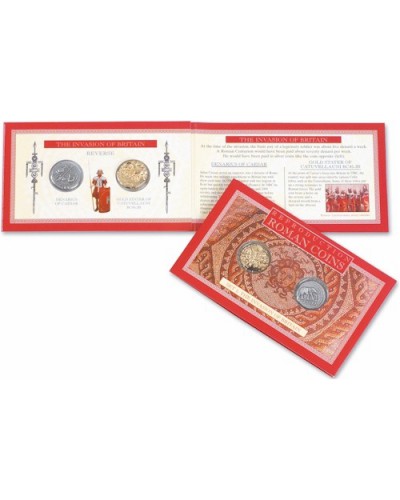Product Description: These reproduction Denarius of Julius Caesar and Stater of Catuvellauni are moulded directly from original coins and are made from pewter. The gold stater is 22ct gold plated. The pamphlet style packaging has holes on the front in which the coins are held in clear blisters. The coin pack has an image of a Roman mosaic on the front and Roman soldiers inside. The pack includes information about the coins and their history. On the back, there is information about how coins were used as newspapers and there is a time chart.
Information: At the time of the invasion of Britain, the basic pay of a legionary soldier was about five denarii a week. A Roman Centurion would have been paid about seventy denarii per week. He would have been paid in silver coins like the Denarius in this pack.
Julius Caesar, never and emperor, was a dictator of Rome. He made two military expeditions to Britain but withdrew each time. In 55BC he landed with two legions in Kent but quickly returned to Gaul (France). In 54BC he again landed, this time with five legions and 2000 cavalry, and succeeded in crossing the Thames before withdrawing. The front of our coin, a silver denarius, depicts an elephant and serpent representing Caesar’s achievement – the conquest of Gaul. The reverse illustrates sacrificial implements publishing his office as Chief Priest (pontifex maximus).
At the point of Caesar’s foray into Britain in 55BC, the country was split into areas ruled by various Celtic tribes, such as the Catuvellauni. Some of these tribes put up a strong resistance to Roman forces. The gold coin bears a horse on the reverse and a decaying wreath from a bust on the obverse.
Roman coins were not just a means of paying for goods. The reverse of the coins were used to communicate great events. Alternatively, the reverse was used to promote the image and status of the Emperor to his people. For example, the Emperor may have depicted a god that had attributes with which he wished to be associated. The coins were circulated throughout the Empire bringing news, perhaps of events that had taken place far away.

